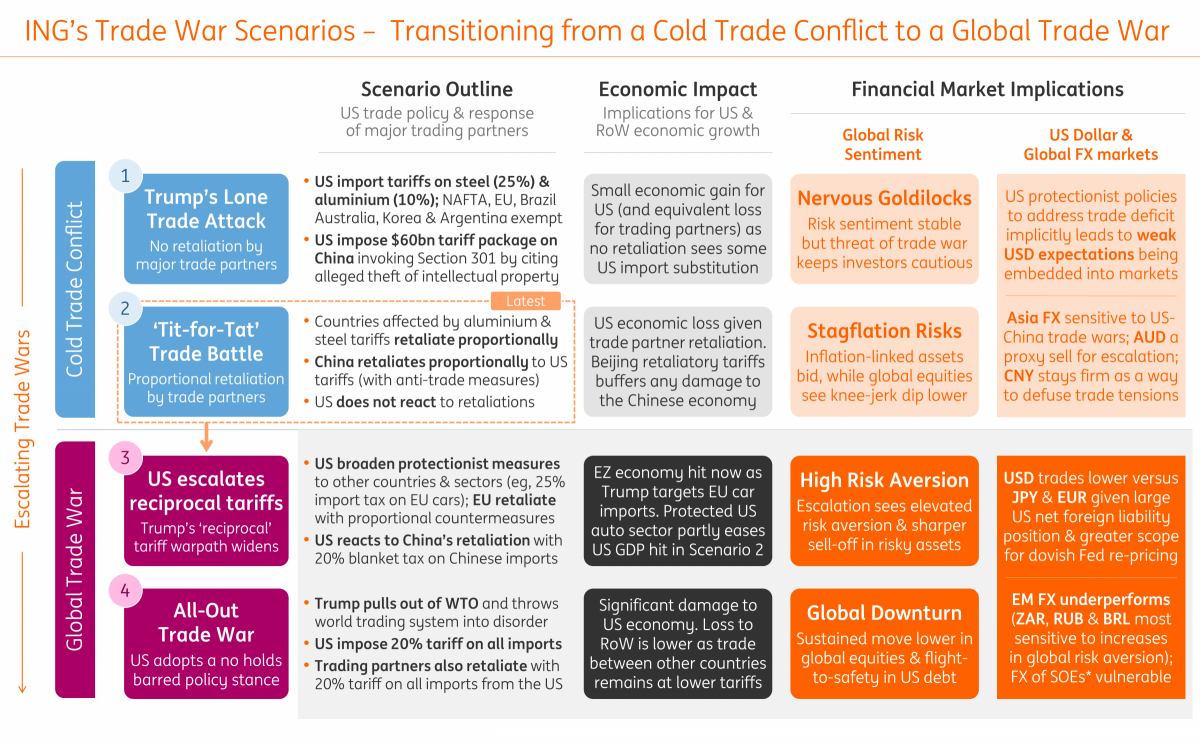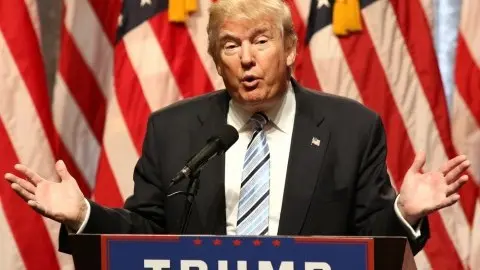A tit-for-tat trade war not enough to take global markets down
All eyes were on President Trump's Twitter feed this morning, and he did not disappoint. Now, the question is whether the US chooses to escalate this trade fight further. If it does, it would be a paradigm shift for global markets - one that could see a sustained sell-off in risky assets, as well as a broader flight-to-safety in FX and bond markets
Fears of a trade war between the world's two largest economies seemed to have returned today as President Trump tweeted this morning, "We are not in a trade war with China, that war was lost many years ago by the foolish, or incompetent, people who represented the US. Now we have a trade deficit of $500 billion a year, with intellectual property theft of another $300 billion. We cannot let this continue!"
But after Beijing's response earlier today of a reciprocal 25% tariff package on US imports including soybeans, aeroplanes and automobiles - we're now in TradeWar Scenario 2.
In isolation, trade wars don't cause a global downturn - nor a sustained sell-off in risky assets
Anyone who thought China would bow to a protectionist US administration only needs to look at how quick the response came. It looks like major trading partners are ready to react even to the detriment of their own economy and global markets. But it's worth bearing in mind that trade wars are a lose-lose situation because political logic is usually dictating rather than any economic rationale.
Our immediate reaction to China news corroborates what we expected for currency markets in a cold trade conflict:
- The Japanese yen seems to be the best vehicle to hedge for escalating TradeWar (target 100)
- The Swiss franc, euro, and sterling are up against a politically weak dollar
- The Australian and Canadian dollar are a proxy sell for US-China trade tensions while the New Zeland dollar is a relative haven in the commodity space
Other markets showed a typical risk-off response initially: Treasury yields were lower, gold went higher, US stocks declined by around 1.5-2.0% on open. However, the follow through to FX markets has been limited.

Tit-for-tat tariffs still keep us in the realms of Defcon 3 when it comes to trade wars - or what we like to call a cold trade conflict as explained in scenario 2 in our graphic.
But for global market dynamics to transition from a cold trade conflict to an actual global trade war, we need to see either:
(1) A broadening of current US protectionist measures to other countries and sectors – and here we highlight US tariffs on EU car imports as the flagship policy.
(2) The US administration reacting to any retaliatory tariffs from China – by imposing larger and potentially blanket tariffs on all Chinese imported goods.
Either of these would be a substantial rise in the average world tariff rate in a way that requires global markets to take significant notice.
In isolation, trade wars don't cause a global downturn - nor a sustained sell-off in risky assets. But what has typically amplified the risks around a trade war is if it coincides with either rise in geopolitical or foreign policy risks or if increased protectionism occurs alongside a slowdown in the global economy. We would put the first as a bigger risk than the latter, though neither are non-negligible.
It is the signalling channel of US trade policy that has been the key driver for the USD in prior ‘trade war’ episodes. Protectionist measures implicitly signal the US administration's desire for a weaker USD – and such expectations are likely to be entrenched in FX markets until credibly broken.
This publication has been prepared by ING solely for information purposes irrespective of a particular user's means, financial situation or investment objectives. The information does not constitute investment recommendation, and nor is it investment, legal or tax advice or an offer or solicitation to purchase or sell any financial instrument. Read more
Download
Download opinion
4 April 2018
In Case You Missed it: Trump’s trade fight This bundle contains 6 Articles
Viraj Patel
Viraj is an FX strategist at ING. He has been with the firm since January 2015 and covers developed markets. Prior to this, he worked at Barclays and the Bank of England. Viraj read Economics at the University of Cambridge and is currently working towards his CFA charter.
Viraj Patel is no longer part of the ING THINK team
